

Essays
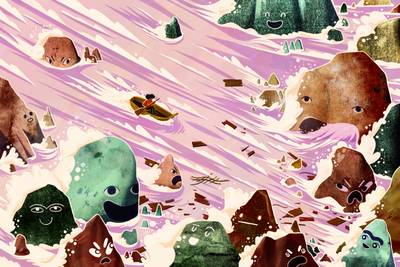

How can we facilitate collective transfers of knowledge and support peer feedback practices in a transdisciplinary cohort? How can we cultivate learning communities where sites of authority are multiple and distributed? How to expand this learning in a microcosm to exist critically and together in the world?
READFeedback in Relation: On Friendship, Microcosms & Constructive Criticism
How can we facilitate collective transfers of knowledge and support peer feedback practices in a transdisciplinary cohort? How can we cultivate learning communities where sites of authority are multiple and distributed? How to expand this learning in a microcosm to exist critically and together in the world?
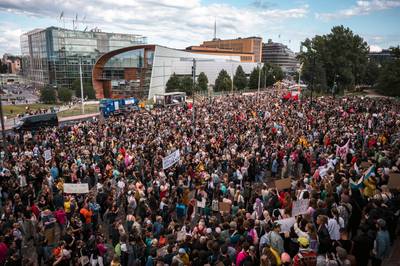

Our solidarity against Prime Minister Orpo’s far-right government doesn’t need to stop with other ethnic minorities but can act as a tool to bring everyone together, irrespective of background, who is set to suffer under the new regime—from the exploited worker to the overworked parent, from the retiree dependent on housing support to the employee looking for a career change—a number easily far higher than the votes the ruling coalition managed to rake in.
READOnly Solidarity, Not Respectability, Can Topple Finland’s Dangerous Far-Right Government
Our solidarity against Prime Minister Orpo’s far-right government doesn’t need to stop with other ethnic minorities but can act as a tool to bring everyone together, irrespective of background, who is set to suffer under the new regime—from the exploited worker to the overworked parent, from the retiree dependent on housing support to the employee looking for a career change—a number easily far higher than the votes the ruling coalition managed to rake in.
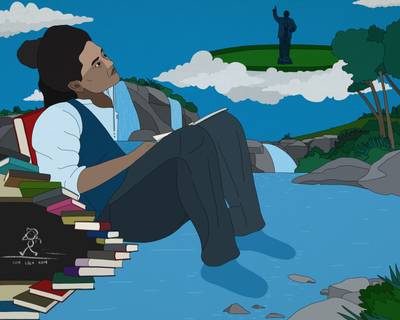

The time and energy it takes to apply myself and think about what I am reading swallows me into a world and leaves me suspended there, making me unavailable to people who aren’t comfortable with the idea of a Dalit person engaging in something that is not her humiliation. Reading is a way of being unavailable to a world that has taught you to remain outside. When we encounter stories about what being able to read and write did for people from the margins, we are essentially encountering the impact of close reading.
READLove Is for the Ones Who Love the Work: How Close Reading Interrupts Caste in the Classroom
In close reading, the body is also learning to pay attention to itself when it responds a certain way to a line, a sentence, or a paragraph. Something that can perhaps only come from leisure and the luxury to sit and have the free time to be available to the text. How many Dalit teachers can afford this?
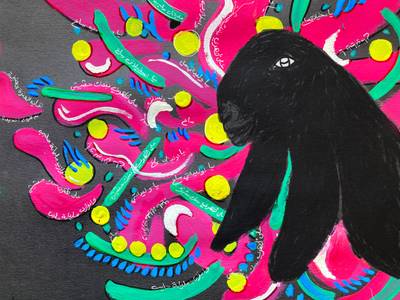

Accused of being “shrewd, rogue, ill-mannered and undisciplined”, the black goat was constantly abducted and killed to prevent it from distorting the European landscape that Israel wished to create on the rubbles of the destroyed Palestinian one. In 1948, the year of the Nakba, Israel began importing a white Swiss goat to replace the black one. The white European goat was described as “polite, beautiful, healthy” and even “civilized”.
READApproaches to Palestinian Liberation: Magical Realism as Resistance Literature
Can literary magical realism be considered a type of resistance literature in the Palestinian context? This essay argues that magical-realistic manifestations—death-defying ghosts, the black goat, soil with resurrection powers, and the malleability of time—found in contemporary Palestinian literature play a significant role in resisting the ongoing effects of the Nakba.
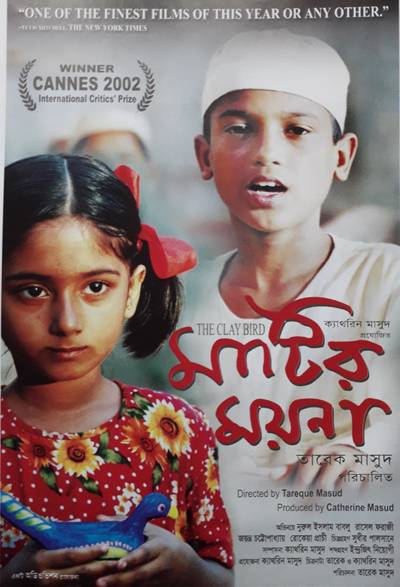

European and US festivals have played a pivotal role in the global circulation of South Asian films. But their contribution has also been marked by questionable priorities: the near-exclusive promotion of Indian films or of films that speak to European and North American cinemas’ aesthetic affinities. With the new millennium, festivals began to embark on film production. How has this practice impacted South Asian filmmakers—women filmmakers in particular—and the visibility of their work?
READSouth Asian Women’s Cinema: Between Festivals & Streaming
European and US festivals have played a pivotal role in the global circulation of South Asian films. But their contribution has also been marked by questionable priorities: the near-exclusive promotion of Indian films or of films that speak to European and North American cinemas’ aesthetic affinities. With the new millennium, festivals began to embark on film production. How has this practice impacted South Asian filmmakers—women filmmakers in particular—and the visibility of their work?
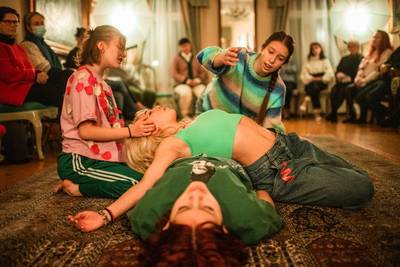

Focusing on movement exploration and feminist performative rewriting of the myth of the Western love goddess, this essay discusses the origin of the work Venus by Janina Rajakangas, performed during the Baltic Circle Festival 2022. It reflects on the collaborative creative process and puts in focus the erotization of young girls and the loud ideas about beauty and desirability that aggressively frame today’s gendered norms, the attention economy of social media, and the patriarchal views on seduction that shape it all.
READVenus, in the Threshold of the Screen
Focusing on movement exploration and feminist performative rewriting of the myth of the Western love goddess, this essay discusses the origin of the work Venus by Janina Rajakangas, performed during the Baltic Circle Festival 2022. It reflects on the collaborative creative process and puts in focus the erotization of young girls and the loud ideas about beauty and desirability that aggressively frame today’s gendered norms, the attention economy of social media, and the patriarchal views on seduction that shape it all.
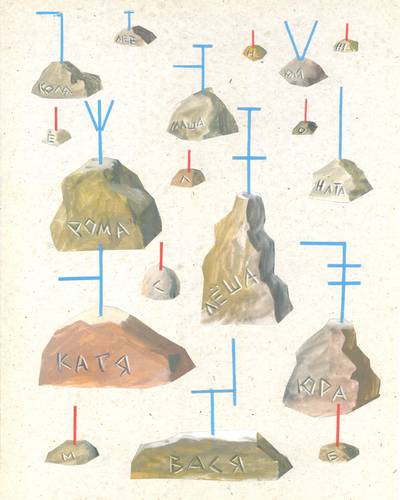

The Russian invasion of Ukraine should be stopped as soon as possible, but how? The world is showing great solidarity with the suffering side, but should it go hand in hand with humiliating, neglecting, and demonizing Russian passport holders? Can the problem be solved by putting more limitations and borders on ordinary citizens already oppressed by an authoritarian state?
READTaking Off a White Coat: Notes From Under Sanctions
Adel Kim considers the perspectives of different art-workers under sanctions and associated with the arts in Russia.
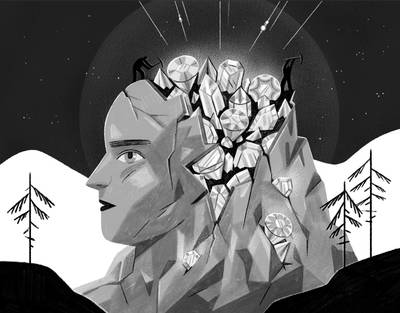

After all the materiality of the world has been grasped, the next natural step of the Great Devourer - capitalism - is to go deeper into the immaterial within the confines of our minds. As we go about our days, we seep valuable information that can be monetized directly and made into codes of control, redirection, and upkeep. A new frontier has been unhinged by cracking our minds open, where the laws are all but settled. Is the immaterial world beyond our ethical discussions and legislative apparatuses too ethereal to be real, or can a reasonable amount of responsibility be demanded everywhere?
READCracking the mind: You Are What the Attention Economy Wants
Sami Juhani Rekola questions the concept of “consent” and a “new work paradigm” in the era of post-peak attention economy, capitalism and polarizing contents.
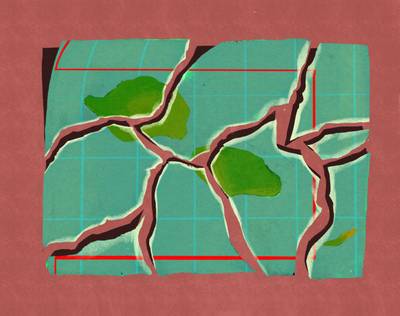

In Samoa, an archipelago situated closeby to the said line, this border was however not abstract. It wasn’t something that could be as easily ignored throughout the remaining year. The line was too close to overlook. By way of geographic proximity, the island chain was more likely touched and disturbed by it. In 2011 the government of the territory thus took matters into their own hands. It decided to change its own future by changing its own place in time. To achieve this modification, Samoa decided to get rid of December 31 2011 in order to be able to slip through the thread of time. While the world had remained in its configurations of time, the island had, with a blink of an eye, altered its own configuration of time. By disappearing December 31 2011, by erasing twenty-four hours, Samoa catapulted itself twenty-four hours ahead into the future.
READJumping Rope With Time
Sinthujan Varatharajah writes on how Europeans subdued and reorganized formerly distant natures, people, and cultures according to their own industrial needs with the help of different technical ‘innovations’, including the infamous clock.
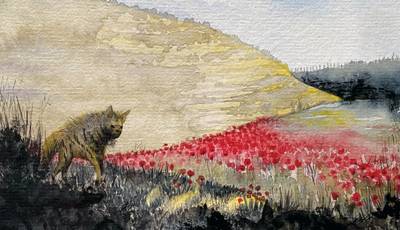

Where the striped hyenas are is not only a place in the imagination or in the past. Where the striped hyenas are is also a possibility for what the future could bring. It’s where they lie, waiting for their turn to return from their exile. Where the hyenas are is also where the ghouls and the djinn are, behind seven mountains, dreaming and chasing their world into being again.
READWhere the Striped Hyenas Are, or, A Tale Is a Map and a Compass: Some Fragments on the Fantastical, Land and Remembrance
Shayma Nader on how can the fantastical embody the political; what if all fantastical creatures were to rise up against the dispossessions and alienations from the lands that sustain them, to which they belong?
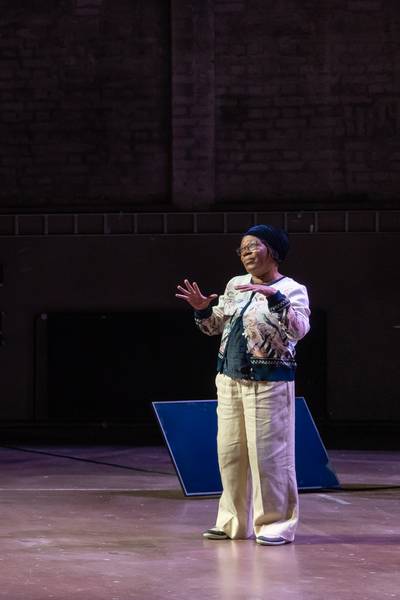

In my view, Sonia Boyce’s presence in Helsinki is complicated by Finnish institutions’ treatment of black people in Finland. This essay thus considers the conditions of possibility that Boyce’s presence catapults for black cultural productions in Finland. To be clear, I am not implying that for black cultural production to make sense in Finland, outside-Finnish-borders blackness needs always to be present; instead, I want to trouble this very tendency that many Finnish institutions seem to rely on.
READNoise, Sound and the Ongoing Project of Black Cultural Production: An Essay Reflecting on Sonia Boyce’s Recent Visit to Finland
Milka Njoroge on the fraught dynamics that structure the relation between art institutions and black people.
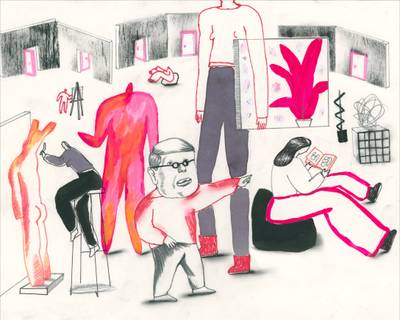

With this text, I’m probing into ongoing processes at Aalto University in the last five years, which, among other things, led to the administrative decision to remove the University-Wide Art Studies (UWAS) program in 2021. The story starts in 2016 when something quite special was cooking in the Art, Design, and Architecture School, and a truly radical form of transdisciplinary education was lived and enjoyed by many, thanks to UWAS. I want to make sense of the sad fallout from such dream; a fallout that happened despite countless protests at different levels of the organization’s pyramid.
READTransdisciplinarity in Higher Education: Wicked Problems, Dreams, and Nightmares
On the ongoing processes at Aalto University in the last five years that led to the administrative decision to remove the University-Wide Art Studies (UWAS) program in 2021.